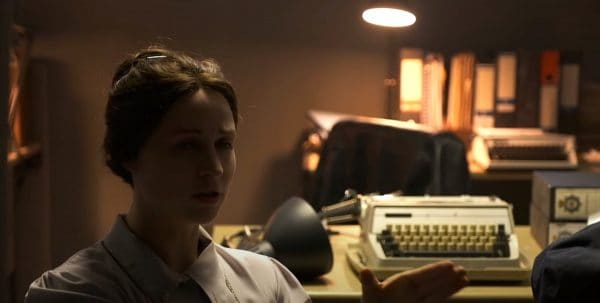Censor, 2021.
Directed by Prano Bailey-Bond.
Starring Niamh Algar, Nicholas Burns, Vincent Franklin, Sophia La Porta, Adrian Schiller, Michael Smiley, Erin Shanagher, Andrew Havill, Felicity Montagu, Danny Lee Wynter, Clare Perkins, Guillaume Delaunay, Richard Glover, Beau Gadsdon, and Amelie Child Villiers.
SYNOPSIS:
After viewing a strangely familiar video nasty, Enid, a film censor, sets out to solve the past mystery of her sister’s disappearance, embarking on a quest that dissolves the line between fiction and reality.
Being fully transparent whether or not it hurts my film knowledge reputation, I haven’t seen many video nasties. However, even before watching Censor, I was familiar with the colloquial term describing banned exploitation horror movies in the 1980s UK, mainly due to consistently consuming information and Sam Raimi’s Evil Dead, labeled a video nasty. The point is that whether you live and breathe these unabashedly gory flicks or not, it shouldn’t take away from or be a deciding factor in what one comes away thinking of Censor.
The film is undoubtedly meta (there’s an opening credits montage sampling some of the most grotesque imagery ever caught on camera) but never keeps the typical moviegoer at arm’s length. That’s mainly because the real intrigue comes from Enid Baines (Niamh Algar, fine demonstrating the psychological breakdown the role requires), a video nasty editor trimming parts that are either too graphic and realistic even for the standards of these movies, or perhaps extended shots that linger on violence too long. Essentially, she is part of the buzzkill censorship committee, as the film’s title would imply. Nevertheless, some of the most entertaining bits of the movie come from pausing it to see what she’s writing down and planning on cutting.
Enid also seems to be under the impression that there are clues to her sister’s disappearance (when they were children) inside a particular video nasty by a fictional filmmaker named Frederick North. Specifically, she becomes fixated on an actress named Alice Lee (Sophia La Porta), that resembles a now grown-up version of her sister, alongside imagery within the movies that seem too real only to be hallucinations. This has been going on for quite some time as Enid’s parents invite her to a dinner where they converse about the situation and her declining mental state.
There’s an undeniably fascinating mystery at the center of Censor smothered in appropriate 80s aesthetical lighting, color palettes, atmosphere, and of course, some gnarly kills, but director Prano Bailey-Bond (writing alongside Anthony Fletcher) never successfully hides where the film is inevitably going to end up. And suppose it’s always intentional for the viewer to know where the story is going. In that case, it’s not necessarily executed cleverly or satisfyingly outside a truly trippy and psychedelic closing sequence. Anything and everything it wants to say about video nasty panic (television speeches blame a rise in violence on the movies, with Enid becoming a target herself after a man reenacts something gross) is reasonably obvious long before Censor concludes. Admittedly, the sights are not easy to shake, so the phone does remain atmospheric even during its few dull moments.
The script also has a pretty genius concept of exploring the possibility that the censor has blocked out horrific acts or memories of their own life, seemingly making a case that all censorship is damaging. Watching Enid consume some of these disturbing movies eagle-eyed is also an engaging vicarious experience, especially when one co-worker asks how she feels about sifting through hours upon hours of exploitative rape sequences. Her retort is priceless.
Still, when Censor is not visually entrancing, deliciously violent, or mildly thought-provoking, it’s usually tripping itself up with detours into sexual abuse that feel at odds with what the climax conveys, or even at a scant 83 minutes somewhat drags getting to its inevitable point. In general, there are a bit too many sub-threads going on but never correctly coalesce. Again, it doesn’t help that once Enid decides to do something and go somewhere, there’s only one place left for the narrative to go. Censor reaches that end game with mixed results but is a short and sweet nightmare getting by on its originality, performances, tributes, and style.
Flickering Myth Rating – Film: ★ ★ ★ / Movie: ★ ★ ★
Robert Kojder is a member of the Chicago Film Critics Association and the Critics Choice Association. He is also the Flickering Myth Reviews Editor. Check here for new reviews, follow my Twitter or Letterboxd, or email me at MetalGearSolid719@gmail.com














